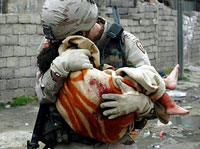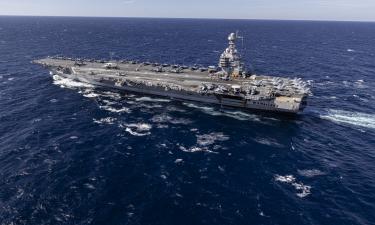Drugs to prevent US soldiers from bringing war back home
The Pentagon's 'Psychological Kevlar Act of 2007' puts forward the idea of using different drugs to insulate combat soldiers from the stressful psychological element of killing. Some have claimed that the move not only desensitises them to the horrendous aspect of war, but also maximises soldiers' lethality by bypassing their moral autonomy.

Pravda.Ru has interviewed Professor Richard J Aldrich, Department of Politics and International Studies University of Warwick, to find out more about this Pentagon’s initiative.
Pravda.Ru: How do you respond to this?
Richard J Aldrich : The so-called "Psychological Kevlar Act of 2007" is not quite what it seems. For decades, many governments have deliberately neglected the terrible impact of war on their young soldiers. Over a third of US servicemen returning from Iraq and Afghanistan are reporting serious psychological problems. In 2006, more than 6,000 US veterans committed suicide. This far more than are being killed in combat. British veterans groups claim that more soldiers have committed suicide after the Falklands War as a result of psychological problems than died in the fighting. Russian soldiers have suffered in a similar way after Chechyna and often return with 'the Chechen syndrome' which ruins their lives.
This initiative is not designed to create killing machines without morals. This is because the drug - Propranolol - is normally taken after a distressing incident, not before. Instead, the US Government it is partly driven by a fear of the scale of the medical and social problems in the years ahead. It also reflects anxiety about legal action by veterans groups seeking compensation. British veterans tried to sue their government in 2002. Most importantly, governments worry that if this problem is not dealt with, they will not be able to fight future insurgencies.
Pravda.Ru: Do you think that a soldier without moral values is a good soldier?
Richard J Aldrich : There are few soldiers without morals. Psychological research show that soldiers actually find it rather difficult to kill, since they bring with them a civilian abhorrence of death. On the battlefield many soldiers discharge their weapons randomly in the hope of protecting themselves, rather than in an effort to kill the enemy. Soldiers insist that they prefer to shoot at targets that are far away, where enemy faces are hard to recognise, or else they kill at very close range when the situation is "kill or be killed".
Terrorism and insurgency corrode the morals of the modern soldier. At the core of the insurgent strategy is the idea of hiding among the people and using civilians as a shield. Soldiers serving in these conflicts do not know if an approaching car contains a farmer or a suicide bomber. A woman who seems pregnant maybe carrying a bomb. Irregular forces also make use of children as soldiers. Although senior officers preach about "hearts and minds", the sad fact is that these sort of conflicts are barbarous and present young soldiers with terrible dilemmas. The worst excesses often occur immediately after a devastating attack, for example a roadside bomb, that dislocates a soldier's moral compass.
Pravda.Ru: Do you think that such measures by the Pentagon could lead to the increased violence rate in the US army?
Richard J Aldrich : The use of this drug is unlikely to lead directly to increased violence. There is no doubt that governments do want effective killing machines. But they prefer to use intensive training designed to override civilian instincts, rather than chemicals. However, if this drug proves successful it will make future military interventions easier. This is because it will reduce one of the highest costs of sending our forces to fight against insurgency, the social cost.
On every continent, young soldiers have been sent off to fight wars for democracy, for freedom, for the rule of law and for other virtues without number. The soldiers are often poorly trained conscripts or part-timers. Ironically, these wars have proved to be some of the most terrible and barbarous conflicts. Few of these expeditions can claim success. Rather than pacifying the local population, the result has been that our own people are destabilised and brutalised. This drug has one purpose, it is designed to prevent the returning soldiers from bringing the war back home in their ruck-sacks.
Prepared by Alexander Timoshik
Pravda.Ru
Subscribe to Pravda.Ru Telegram channel, Facebook, RSS!





